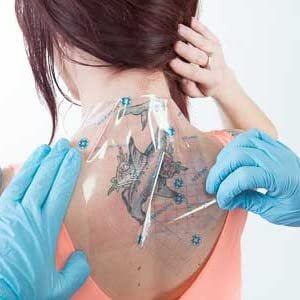Getting a new tattoo can be an exciting experience, but it's important to remember that a tattoo is essentially a wound that needs to heal properly. While most tattoos heal without any issues, sometimes things can go awry. Knowing how to identify tattoo healing problems early can save you from discomfort and preserve the quality of your tattoo. In this guide, we’ll walk through the normal stages of tattoo healing, what signs to look out for, and how to address common issues.

The Tattoo Healing Process
Before diving into potential problems, let's understand what a normal healing process looks like for a new tattoo.
The First Week: Initial Healing
During the first few days after getting inked, it's normal for the tattoo to be red, swollen, and tender. You might also notice oozing of plasma, ink, or even a small amount of blood. This is your body's way of cleaning the wound. As you move through the week, these symptoms should gradually subside.
The Second Week: Peeling and Itching
As the tattoo enters its second week, you may see peeling and experience itching. Peeling is akin to a sunburn and is part of the natural shedding of the skin. Itching, while annoying, is a sign that the skin is healing. It's crucial not to scratch or pick at the tattoo during this time.
The Third and Fourth Weeks: Final Stages
By the third week, any peeling and itching should lessen. The tattoo may still look a bit dull or cloudy as the deeper layers of skin heal. By the end of the fourth week, the tattoo should look clear, and the skin should feel back to normal.
Common Tattoo Healing Problems
Even with proper care, sometimes tattoos develop healing problems. Here’s what to watch for:
Infection
An infection is one of the more severe tattoo healing problems. Symptoms include increased pain, swelling, redness, or a foul odor coming from the tattoo. If the tattoo feels hot to the touch or you develop a fever, seek medical attention immediately.
Allergic Reactions
Allergic reactions to the ink or aftercare products can occur. Signs include a rash, bumps, or excessive itching that doesn't improve. If you suspect an allergic reaction, contact your tattoo artist or a dermatologist for advice.
Over-Moisturizing
While keeping your tattoo moisturized is crucial, too much of a good thing can cause issues. Over-moisturizing can lead to clogged pores and breakouts or hinder the skin’s ability to breathe and heal properly.
Poor Aftercare Practice
Neglecting aftercare recommendations like keeping the tattoo clean and moisturized, avoiding sun exposure, and not picking at scabs can lead to prolonged healing or damage to the tattoo design.
Excessive Scabbing or Scarring
A small amount of scabbing is normal, but thick, heavy scabs may indicate a problem. Scabs should not be picked at as this can pull out the ink and lead to scarring or infection.

Tattoo Tips: How to Avoid Healing Complications
To prevent tattoo healing problems, follow these tips:
Follow Your Tattoo Artist's Aftercare Instructions
Your tattoo artist should provide you with a set of aftercare instructions. Follow these guidelines closely, as they are tailored to your specific tattoo and skin type.
Keep the Tattoo Clean
Gently wash your tattoo several times a day with lukewarm water and fragrance-free soap. Pat it dry with a clean paper towel.
Moisturize Appropriately
Apply a thin layer of fragrance-free moisturizer or a product specifically designed for tattoo aftercare. Don't overdo it; a little goes a long way.
Wear Loose Clothing
Loose-fitting clothes will prevent irritation and allow the tattoo to breathe as it heals.
Avoid Picking and Scratching
No matter how tempting it may be, do not pick at scabs or scratch your tattoo. Doing so can cause damage and lead to infection.
Stay Out of the Sun and Water
Keep your tattoo out of direct sunlight and avoid swimming or soaking in water for extended periods until your tattoo is fully healed.
When to See a Doctor
If you notice any signs of infection or an allergic reaction, it's crucial to seek medical attention. Delaying treatment can lead to further complications and may compromise the appearance of your tattoo.

Long-Term Tattoo Care
Even after your tattoo has healed, it's important to continue taking care of it to maintain its vibrancy and clarity. Apply sunscreen to your tattoo when exposed to the sun, keep the skin moisturized, and stay hydrated.
Conclusion
Understanding the healing process and recognizing tattoo healing problems early on is key to ensuring your tattoo heals beautifully and stands the test of time. By following proper aftercare instructions and being attentive to your body's signals, you can avoid complications and enjoy your new artwork for years to come. Remember, if in doubt, reach out to your tattoo artist or a healthcare professional for guidance. Your tattoo is a lifelong investment, so give it the care it deserves!
